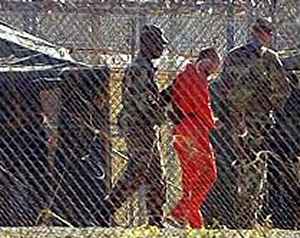| are being held in violation
of the U.S. Constitution and Geneva Conventions, said Tom Mrozak, spokesman
for the U.S. attorney's office.
The petition for a writ of
habeas corpus asks that the prisoners be brought before a judge to hear
the charges against them. It also seeks to prevent the military from transferring
any more prisoners to the base.
Yagman said the judge asked
the petitioners to address a number of issues at Tuesday's hearing, including
the legal basis under which they are asserting their claims. The judge
is considering only issues surrounding whether he should hear the suit,
not the merits of it, Yagman said.
The military began transferring
prisoners from Afghanistan to Guantanamo this month. It classifies the
detainees as "war criminals," not prisoners of war, thereby exempting them
from requirements under the 1949 Geneva Convention, which was ratified
but not signed by the United States.
Nonetheless, military officials
contend the United States is treating the prisoners well, while still maintaining
rigid security measures.
But Ramsey Clark, who served
as attorney general under President Lyndon B. Johnson from 1967-1969, said
the detainees most certainly are entitled to civil rights.
"If they're POWs, they can't
be questioned," he said on CNN's "American Morning." "They shouldn't have
been detained the way they have and questioned the way they have. If they're
not POWS, then if you're going to detain them you've got to charge them
with a crime and present them to a magistrate to determine whether there's
probable cause to hold people."
Clark also warned that the
treatment of the prisoners -- shaving their heads and beards, covering
their heads in hoods, chaining them and putting them "in what we call kennels"
-- accomplishes little but making "a billion people in the world very,
very angry."
"That's a way to make enemies
and to have more victims all the way around," he said. "Let's treat them
with respect and let's treat them in accordance with law. And let's above
all obey the Geneva Convention. If we don't, how do we expect our prisoners,
if we ever have any, to be treated fairly?"

|
